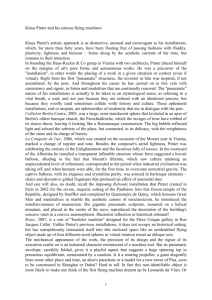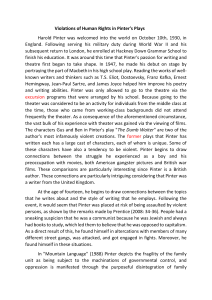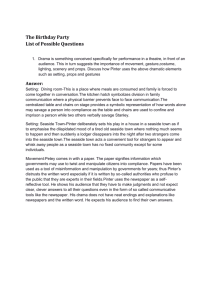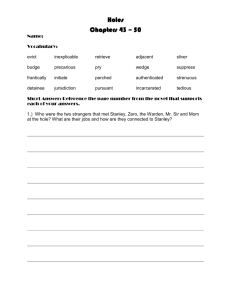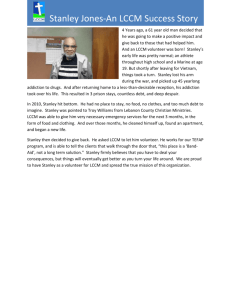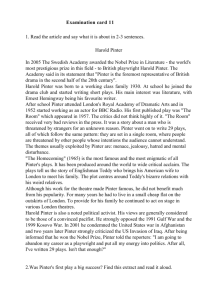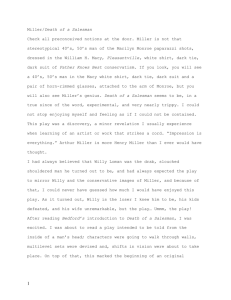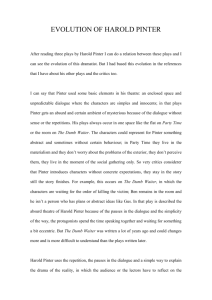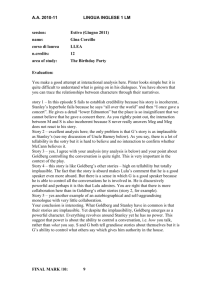A brief synopsis of the plot
advertisement
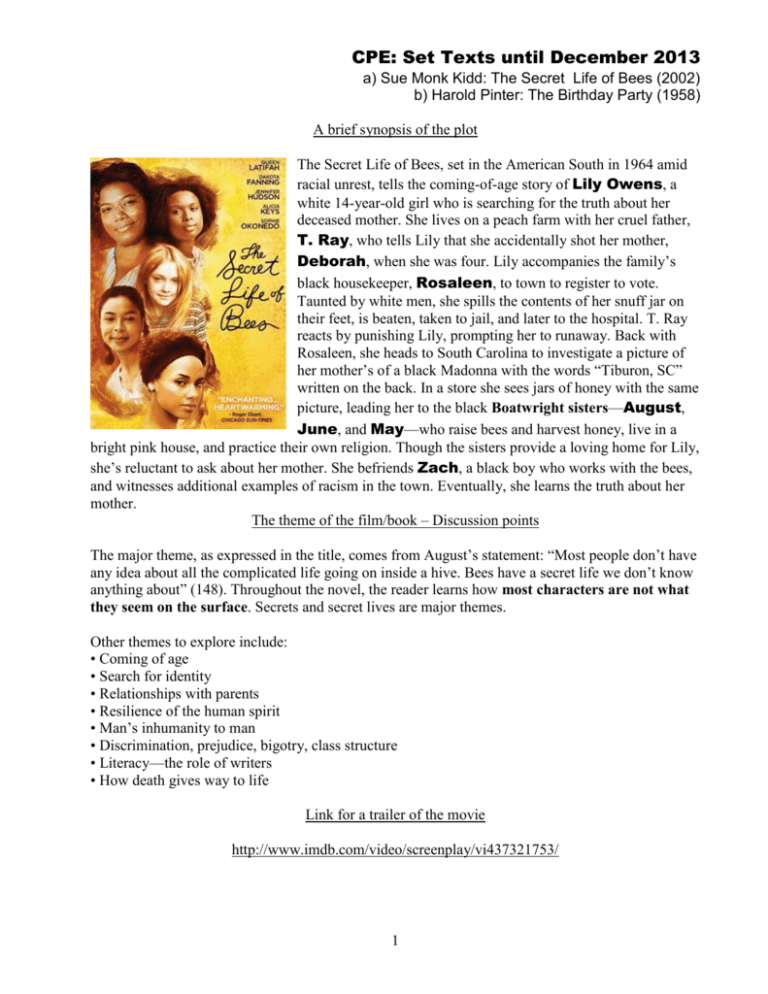
CPE: Set Texts until December 2013 a) Sue Monk Kidd: The Secret Life of Bees (2002) b) Harold Pinter: The Birthday Party (1958) A brief synopsis of the plot The Secret Life of Bees, set in the American South in 1964 amid racial unrest, tells the coming-of-age story of Lily Owens, a white 14-year-old girl who is searching for the truth about her deceased mother. She lives on a peach farm with her cruel father, T. Ray, who tells Lily that she accidentally shot her mother, Deborah, when she was four. Lily accompanies the family’s black housekeeper, Rosaleen, to town to register to vote. Taunted by white men, she spills the contents of her snuff jar on their feet, is beaten, taken to jail, and later to the hospital. T. Ray reacts by punishing Lily, prompting her to runaway. Back with Rosaleen, she heads to South Carolina to investigate a picture of her mother’s of a black Madonna with the words “Tiburon, SC” written on the back. In a store she sees jars of honey with the same picture, leading her to the black Boatwright sisters—August, June, and May—who raise bees and harvest honey, live in a bright pink house, and practice their own religion. Though the sisters provide a loving home for Lily, she’s reluctant to ask about her mother. She befriends Zach, a black boy who works with the bees, and witnesses additional examples of racism in the town. Eventually, she learns the truth about her mother. The theme of the film/book – Discussion points The major theme, as expressed in the title, comes from August’s statement: “Most people don’t have any idea about all the complicated life going on inside a hive. Bees have a secret life we don’t know anything about” (148). Throughout the novel, the reader learns how most characters are not what they seem on the surface. Secrets and secret lives are major themes. Other themes to explore include: • Coming of age • Search for identity • Relationships with parents • Resilience of the human spirit • Man’s inhumanity to man • Discrimination, prejudice, bigotry, class structure • Literacy—the role of writers • How death gives way to life Link for a trailer of the movie http://www.imdb.com/video/screenplay/vi437321753/ 1 CPE: Set Texts until December 2013 a) Sue Monk Kidd: The Secret Life of Bees (2002) b) Harold Pinter: The Birthday Party (1958) A brief synopsis of the plot The Birthday Party opens in the living-dining area of a seedy rooming house at an unnamed seaside resort in England. Petey and Meg Boles, the proprietors, converse while she prepares his breakfast and he reads the newspaper. Their talk is inane, centering on their tenant, Stanley Webber. Petey also tells her of two strangers who might come to rent a room. Meg decides to wake Stanley for breakfast and goes to his room. Unshaven and half-dressed, Stanley comes downstairs and sits at the table to eat. After Petey goes off to work, Stanley teases Meg about her "succulent" fried bread, but when she becomes affectionate, he gets irritated and complains that her tea is "muck" and the place is a "pigsty." Meg tells Stanley about the two men who may be new tenants. At first he is worried but then shrugs the information off as a ‘‘false alarm.’’... » The theme of the play – Discussion points According to Pinter's official biographer, Michael Billington, in Harold Pinter, echoing Pinter's own retrospective view of it, The Birthday Party is "a deeply political play about the individual's imperative need for resistance,"yet, according to Billington, though he "doubts whether this was conscious on Pinter's part," it is also "a private, obsessive work about time past; about some vanished world, either real or idealised, into which all but one of the characters readily escapes. ... From the very outset, the defining quality of a Pinter play is not so much fear and menace –– though they are undoubtedly present –– as a yearning for some lost Eden as a refuge from the uncertain, miasmic present". As quoted by Arnold P. Hinchliffe, Polish critic Grzegorz Sinko points out that in The Birthday Party "we see the destruction of the victim from the victim's own point of view: "One feels like saying that the two executioners, Goldberg and McCann, stand for all the principles of the state and social conformism. Goldberg refers to his 'job' in a typically Kafka-esque official language which deprives the crimes of all sense and reality." ... [Of Stanley's removal, Sinko adds:] "Maybe Stanley will meet his death there or maybe he will only receive a conformist brainwashing after which he is promised ... many other gifts of civilization...."[20] Link for a trailer of the play http://www.youtube.com/watch?v=jSFpARo8pOI 2
